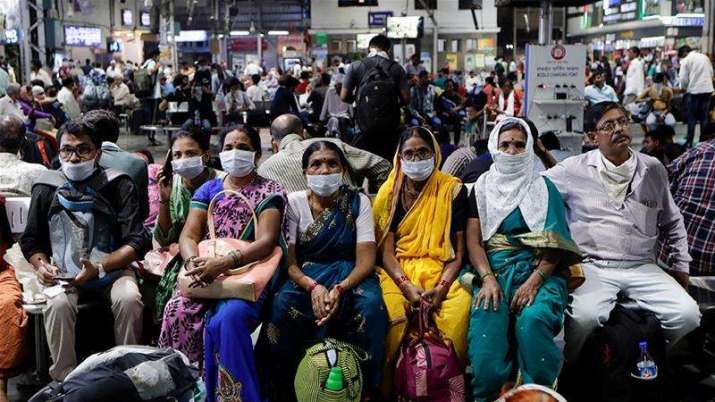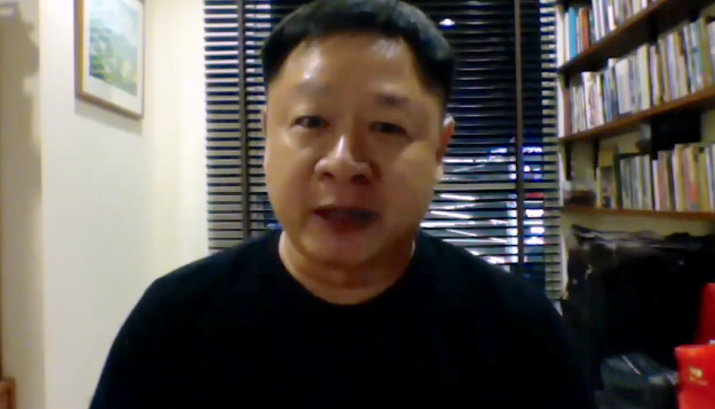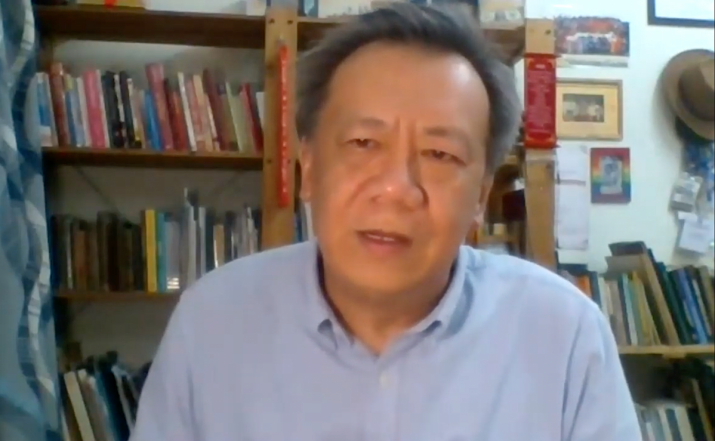NEWS
Buddhist Responses to COVID-19: INEB Joins Dialogue on Global Faith Engagement
 As COVID-19 overwhelms healthcare systems and paralyzes economies, concern is growing about the devastating impact on vulnerable communities. From facebook.com
As COVID-19 overwhelms healthcare systems and paralyzes economies, concern is growing about the devastating impact on vulnerable communities. From facebook.comTwo senior members of the International Network of Engaged Buddhists (INEB), Buddhist social activist Somboon Chungprampree and Buddhist leader and entrepreneur K.V. Soon Vidyananda, joined Berkley Center for Religion, Peace, and World Affairs Senior Fellow Katherine Marshall on 21 May for a webinar to discuss the COVID-19 crisis from the perspective of socially engaged Buddhists. The far-reaching dialogue examined some of the underlying causes, ongoing effects, and engaged responses that have characterized the global pandemic and impacted the lives of billions of people.
Titled “The COVID-19 Crisis: Faith Engagement Between Peace and Conflict in Asia,” the dialogue is one of a series hosted by the Washington, DC-based Berkley Center that explores the impact of the pandemic on faith communities and the ways and means in which they are reaching out to address and mitigate the crisis. Spiritual traditions and the institutions that represent them have taken on key roles in supporting those affected, as well as in emphasizing the need for implementing foundational social reforms based on lessons learned from the crisis. The Berkley Center is an academic research center at Georgetown University that “seeks a more just and peaceful world by deepening knowledge and solving problems at the intersection of religion and global affairs through research, teaching, and engaging multiple publics.” (Berkley Center)
Based in Thailand, Somboon Chungprampree is a social activist working for peace and justice in Asia, and the executive secretary of the International Network of Engaged Buddhists (INEB). He has held positions with key Asian and international civil society organizations and serves on the boards of several national and international foundations.
K. V. Soon Vidyananda is the vice president of the Buddhist Missionary Society Malaysia, a member of the INEB executive committee, and coordinator for INEB’s Buddhist-Muslim interfaith forum. He is the co-founder of several educational initiatives, and has taught Buddhism for many years, alongside his role as a development consultant.
The premise of the dialogue addressed how the common threat of the coronavirus has presented unique challenges to each affected country, unfolding a two-pronged crisis of treating and containing COVID-19 infections, and the subsequent social and economic repercussions. In several Asian countries, this has exacerbated communal tensions linked to rising nationalism and inter-religious and inter-ethnic discord. This talk cast particular light on the most vulnerable during the escalating crisis, the formal and informal mechanisms available to support them, as well as the structures and imbalances that have been instrumental in allowing the crisis to exact such a heavy toll on communities and societies.
“One thing about COVID is that it is making us wear masks. But at the same time, COVID is also unmasking many issues,” Somboon explained. “First of all we have ignorance about mother nature. The virus and everything brings out what we don’t know about nature. As human beings, we have to consider that we have much ignorance about nature. Part of the problem comes when we try to conquer it, to be a master of nature, which is not wise. We need to learn to be humble, that there is much to be learned from nature. . . .
“The second thing that COVID unmasks is that the market economy is very sensitive and very fragile. . . . We have to rethink much about our world economic system. How we are going to be in the future, when another pandemic happens, so that we can cope better and longer. So that people will not immediately be in poverty or jobless, killing themselves. . . . That’s another thing that COVID unmasks.
“Third . . . COVID unmasks much about the world’s leaders: how they cope, how they deal with issues. You know that in many countries where there are women leaders—Taiwan, New Zealand, Korea, China, and other countries—they seem to be dealing better with COVID than other countries, that are just blaming others rather than collaborating. . . .
“Another issue that COVID unmasks is about the spiritual well-being of human society. We see the cases of those who are panicked, who are depressed, who are committing suicide are increasing, because of this pandemic, because of this crisis.
“These factors combine together and thus COVID is helping to unmask the hidden connections among these issues. They are interconnected. This I think of as a global phenomenon, and we have to deal with these issues together, seeing the need for a systemic change, a structural change. . . . We need to be looking at the whole system.”
INEB was established in Thailand, in 1989 by the prominent Thai academic, activist, and social critic Sulak Sivaraksa and a group of Buddhist and non-Buddhist thinkers and social activists. It was formed with the aim of connecting engaged Buddhists around the world to promote understanding, cooperation, and networking among inter-Buddhist and inter-religious groups, and to address global issues such as human rights, conflict resolution, and environmental concerns. INEB’s members include monks, nuns, activists, academics, and social workers from more than 25 countries in Asia, Australasia, Europe, and North America.
 INEB executive secretary Somboon Chungprampree. From youtube.com
INEB executive secretary Somboon Chungprampree. From youtube.comVidyananda sought to address religious responses to the crisis, and the apparent increase in inter-communal tensions, hate speech, and disinformation, and the challenge for religious leadership and institutions seeking to respond.
“Let me try to find the right word. I think the word is distraction, because I don’t think anyone has yet really addressed issues of conflict deeply enough come to clear conclusions,” Vidyananda emphasized. “In specific smaller communities where we work, we have gone into conflict zones and we try to do conflict mediation and resolution in that space. But really addressing the root of conflicts from the religious actors’ perspective, I don’t think so yet.
“In my view, with COVID-19 we have shifted our attention to something else. First, we have shifted our attention to trying to help the people that need help immediately. . . . There are a number of interfaith groups in Malaysia, . . . in Thailand, and in other parts of Asia that have come together to support people. On the other hand, we have seen, with the migrant communities in Malaysia, for example, that there is great separation.
“So there’s a sharp dichotomy in reactions that’s happening now, because we are all reacting to the situation. That’s why I’m a strong believer that while we are trying to address issues today we must not lift our foot off the pedal. We still need to continue to focus on the core issues and on the structural issues, because we don’t want to make this a distraction. . . . This is where networks come in. We talk to each other, we connect . . . we try to get as much information as possible, and from the information we devise our actions.”
 INEB executive committee member and Buddhist Missionary Society Malaysia vice president K. V. Soon Vidyananda. From youtube.com
INEB executive committee member and Buddhist Missionary Society Malaysia vice president K. V. Soon Vidyananda. From youtube.comAt the time of writing on 27 May, global confirmed SARS-CoV-2 coronavirus infections were reported to have reached 5.6 million, with 350,547 deaths so far recorded and 2.3 million recovered.* The World Health Organization in March estimated the mortality rate from the virus at 3–4 per cent, based on incomplete and preliminary data, with the elderly and people with underlying health conditions considered most at risk. More recent data suggests that the mortality rate may be significantly lower, however studies are inconclusive due to variations in COVID-19 testing procedures in different countries, and different methodologies for classifying and reporting COVID-19 as a cause of death.
See more
The COVID-19 Crisis: Faith Engagement Between Peace and Conflict in Asia (Berkley Center for Religion, Peace & World Affairs)
International Network of Engaged Buddhists
Mindful Action: COVID-19 Emergency Relief Fund, International Network of Engaged Buddhists (INEB) (INEB)
Statement Concerning the COVID-19 Pandemic from International Network of Engaged Buddhists (INEB) (INEB)
INEB - International Network of Engaged Buddhists (Facebook)
Related news from Buddhistdoor Global
INEB Issues Public Statement for a Compassionate Global Response to the Coronavirus Crisis
International Network of Engaged Buddhists Launches COVID-19 Emergency Relief Fund
FHSM Delivers Emergency Relief to Vulnerable Communities Under Lockdown in India
Buddhist teachers form “Dharma Relief” to Raise over US$500,000 in Response to Coronavirus
Korean Zen Master Pomnyun Sunim Offers Buddhist Guidance for Coping with the Pandemic
Related features from Buddhistdoor Global
Buddhistdoor View: The Astonishing and Fleeting Opportunity of This Moment
Unity and Interdependence: Joining Together Through Our Crisis
The Wisdom of Uncertainty














